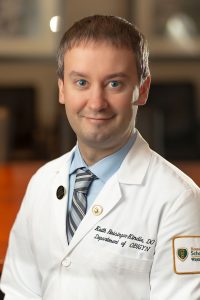Keith Reisinger-Kindle, D.O., assistant professor and associate program director of obstetrics and gynecology, and Erica Taylor, M.D., assistant professor of pediatrics, received a nearly $750,000 grant to continue and expand an antiracism and social justice training program in the Wright State University Boonshoft School of Medicine.
The program uses intergroup dialogue, which has been widely used in community settings to increase trust, decrease stereotypes, establish common ground and increase perspective-taking.
“Intergroup dialogue is an established antiracism and social justice educational model that was born out of the need to bring together communities who have historical conflicts and find ways to move forward. To date it has been used in over 400 cities across the country in a similar purpose,” said Reisinger-Kindle.
Over the last three decades, the model has been brought into academic spaces, primarily undergraduate psychology programs, and it was found to have great general application. Reisinger-Kindle and Taylor said that this is the first time it has been brought to medical education spaces.
Prior to receiving the grant, two faculty and staff members and one resident cohort in the Boonshoft School of Medicine successfully completed the training.
The three-year grant will allow the Boonshoft School of Medicine to rapidly expand the program to include not only additional cohorts at Wright State but also regional partners.
“That is the ultimate goal, partnering with other medical educational programs at the University of Cincinnati, TriHealth and also programs in Columbus,” said Reisinger-Kindle.

Keith Reisinger-Kindle is assistant professor and associate program director of obstetrics and gynecology in the Boonshoft School of Medicine.
The program is conducted by trained peer facilitators who lead participants through a series of structured activities. These activities encourage participants to investigate and explore their own personal journeys as well as the journeys of fellow participants.
“You try to find mutual understanding through the lens of antiracism and to promote understanding of your own implicit bias,” said Taylor, who was part of the first faculty cohort at the Boonshoft School of Medicine. “You get to realize things about yourself as well as the perspectives of others through a series of conversations, games and reflections. It creates a vulnerable space where you can have these kinds of conversations but gives you a safe space to do so in.”
Reisinger-Kindle said that when most people think about diversity, equity and inclusion training, implicit bias or antiracism education, the first thing that pops into their heads is an implicit bias lecture or a group discussion.
“This is profoundly more than that. That is why it is so successful. It’s longitudinal,” Reisinger-Kindle said. “You can’t just do one session. We meet 10 times a year, once a month, and that allows the participants to really wrestle with these topics and apply them to their lives. This isn’t just about our lives in medicine. It is about our lives as humans. It is as applicable in the grocery store as it is in the exam room. It doesn’t really matter if you are a social justice warrior and have been doing this work for decades or if this is the first time you have been in a room talking about racism. Those folks are in the room together and each group grows in awesome ways.”


 Wright State psychology team studies ways to identify fatigue in pilots, drivers
Wright State psychology team studies ways to identify fatigue in pilots, drivers  Wright State videographer Kris Sproles wins Regional Emmy and Ohio journalism award
Wright State videographer Kris Sproles wins Regional Emmy and Ohio journalism award  Wright State Boonshoft School of Medicine ranked among the nation’s best for 2024 by U.S. News
Wright State Boonshoft School of Medicine ranked among the nation’s best for 2024 by U.S. News  Exposing biotechnology
Exposing biotechnology  Wright State faculty member Dan Noel uses unique background to inspire new leaders
Wright State faculty member Dan Noel uses unique background to inspire new leaders 